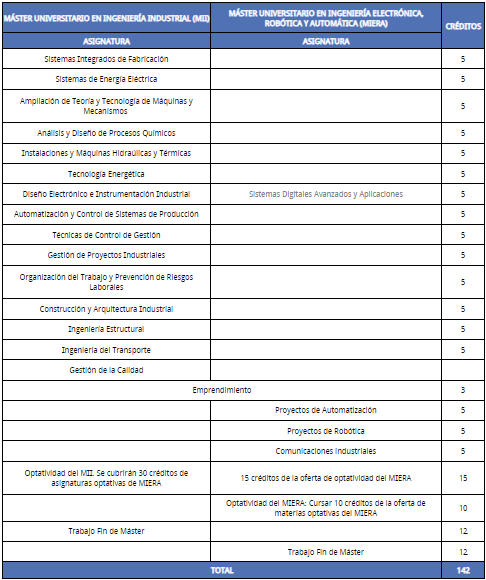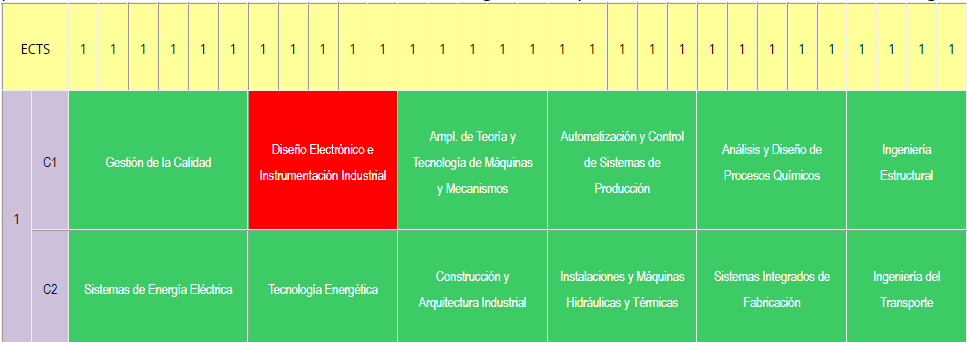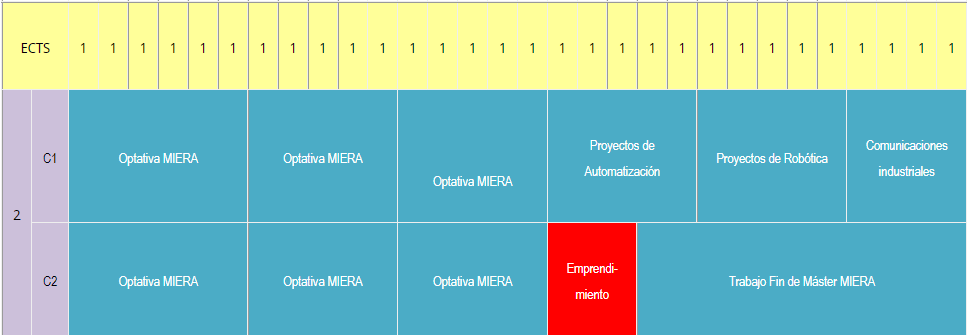Joint curricular itinerary for the double degree
- Description. A curricular itinerary is proposed to jointly study the Master's Degrees in Industrial Engineering (MII) and in Electronic, Robotics and Automatic Engineering (MIERA), based on the complementarity between both degrees.
- Purpose. The completion of the itinerary leads to obtaining the two degrees that compose it.
- The programming teacher has the following characteristics:
- The optional module (30 credits) of the Master of Industrial Engineering will be taken through subjects from the Master in Electronic, Robotics and Automatic Engineering. This possibility appears as an option in the report of the Master in Industrial Engineering. The specific list of subjects to be taken is the following::
- Automation Projects
- Robotics Projects
- Industrial communications
- Three subjects (15 credits) to choose from among the MIERA elective offerings
- The subject “Entrepreneurship”, of 3 credits, is common to both master's degrees, so only the subject corresponding to the Master's Degree in Electronic, Robotics and Automatic Engineering will be taken.
- The subject Electronic Design and Industrial Instrumentation of the MII has the same contents as the subject Advanced Digital Systems and Applications of the MIERA, so only the subject corresponding to the MII will be taken.
- The Master in Industrial Engineering will therefore take all the compulsory subjects except Entrepreneurship.
- Of the Master in Electronic, Robotics and Automatic Engineering, all mandatory subjects will be taken except Advanced Digital Systems and Applications and all electives.
- Additionally, it is necessary to take into account that the Master in Industrial Engineering includes a Leveling Block, composed of subjects intended for all students of the Industrial Engineering program (composed of the Degree in Industrial Technology Engineering plus the Master in Industrial Engineering) acquire the same skills, regardless of the degree with which they access the Master's Degree. These subjects, which are within the optional module of the Master in Industrial Engineering, must be taken, if the Academic Committee of the master deems it necessary, in addition to the 142 credits of the double Master as training complements. They are the following:
- Rational Mechanics Complements
- Numerical methods
- Heat Transmission Complements
- Manufacturing Technology Complements
- Electrical Technology Accessories
- Mathematics applied to Engineering

- The optional module (30 credits) of the Master of Industrial Engineering will be taken through subjects from the Master in Electronic, Robotics and Automatic Engineering. This possibility appears as an option in the report of the Master in Industrial Engineering. The specific list of subjects to be taken is the following::
- Number of credits in the itinerary. The total number of credits for the double Master's degree is 142.
- Access. As access requirements, it will be required to meet both the access requirements to the MII and those corresponding to the MIERA, with the respective Academic Committees retaining the powers over the assessment of candidates and the establishment of training complements and leveling subjects to which the reports refer. verification, with the exception of the subjects specified in section 3f of this section, which will be considered training complements for the double Master's degree.
- Recommended entry profile. The double degree itinerary is aimed at students with previous training at degree level in Electronic Engineering or Robotics and Automation.
- Offer of places. In principle, they intend to offer 5 places for this double itinerary, a number that may be modified in subsequent courses depending on demand.
- Teaching organization.
- Groups. The MII subjects will be taken jointly with the students who continue the studies of said degree. Likewise, the MIERA subjects will be taught jointly with the students taking this degree. The schedule of these master's degrees will be defined so that there are no schedule incompatibilities in the double degree.
- Academic bodies. Each degree will be managed by its corresponding Academic Commission, which in relation to admission to studies and the creation of the Leveling Block for each student, will act in a coordinated manner.
- Timing of teachings. The following tables show the timing of the different subjects, indicated in:
- Green: Subjects to be taken at the MII.
- Blue: Subjects to be taken at MIERA.
- Red: Common subjects.



Summary of the proposal (without leveling subjects)
 *Includes 30 leveling credits to be taken according to previous training.
*Includes 30 leveling credits to be taken according to previous training.
